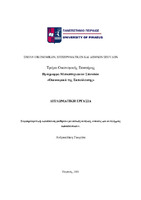Συμπεριληπτική εκπαίδευση μαθητών με ειδικές ανάγκες, στάσεις και αντιλήψεις εκπαιδευτικών
Inclusive education for students with special needs, teachers’ attitudes and perceptions

Προβολή/
Λέξεις κλειδιά
Συμπεριληπτική εκπαίδευση ; Ισότιμη εκπαίδευση ; Στάσεις εκπαιδευτικών ; Ειδικές ανάγκεςΠερίληψη
Τα παιδιά με ειδικές ανάγκες και αναπηρίες αναμφισβήτητα έρχονται αντιμέτωπα με πολλά εμπόδια κατά την εκπαιδευτική διαδικασία. Η συμπεριληπτική εκπαίδευση συμβάλει στην προώθηση της ισότιμης και ποιοτικής εκπαίδευσης για όλους. Πρόκειται για μια διαδικασία που εστιάζει στα μοναδικά και ιδιαίτερα χαρακτηριστικά κάθε παιδιού.
Καθοριστικό ρόλο στην προώθηση της συμπεριληπτικής εκπαίδευσης έχουν οι εκπαιδευτικοί και τα στελέχη εκπαίδευσης. Σκοπός της παρούσας εργασίας ήταν να διερευνήσει τις στάσεις και αντιλήψεις των εκπαιδευτικών για τη συμπερίληψη στις γενικές τάξεις παιδιών με αυτισμό, με διάσπαση προσοχής και υπερκινητικότητα, με νοητική καθυστέρηση και με ειδικές μαθησιακές δυσκολίες. Ακόμη, η εργασία είχε ως στόχο να εντοπιστούν παράγοντες που συμβάλουν ή δυσχαιρένουν την συμπεριληπτική διαδικασία. Το δείγμα της έρευνας αποτελείται από 206 εκπαιδευτικούς και στελέχη εκπαίδευσης των περιφεριακών ενοτήτων των Αθηνών, της Θεσσαλονίκης και της Κρήτης.
Προκειμένου να καταγραφούν οι στάσεις χορηγήθηκε ερωτηματολόγιο το οποίο βασίστηκε στο ερευνητικό εργαλείο Teacher Attitude Inclusion Scale (TAIS) των Monsen, Ewing & Boyle (2014), και τη σχετική βιβλιογραφία το οποίο αποτελεί μη σταθμισμένο εργαλείο με κλειστού τύπου ερωτήσεις. Τα αποτελέσματα της παρούσας έρευνας έδειξαν ότι οι εκπαιδευτικοί εμφανίζουν θετικές στάσεις για τη συμπερίληψη μαθητών με Ε.Α. και αναπηρίες αλλά οι στάσεις τους αυτές εξαρτώνται από το είδος της αναπηρίας το οποίο καλούνται να αντιμετωπίσουν. Συγκεκριμένα, οι εκπαιδευτικοί τείνουν να είναι περισσότερο αρνητικοί στη συμπερίληψη παιδιών στο φάσμα του αυτισμού καθώς και παιδιών με νοητική καθυστέρηση. Ακόμη αναδείχθηκε η συμβολή της ενασχόλησης με την ειδική αγωγή, είτε ως απόκτηση εμπειρίας είτε ως άντληση εξειδικευμένων γνώσεων στη διαμόρφωση θετικών στάσεων προς τη συμπερίληψη. Τέλος οι ερωτώμενοι υπέδειξαν ότι μόνο δύο παράγοντες έτσι όπως υφίστανται σήμερα στα σχολεία λειτουργούν υποστηρικτικά στη συμπεριληπτική διαδικασία, οι οποίοι είναι η στάση της διοίκησης και το επίπεδο συνεργασίας των εκπαιδευτικών.


